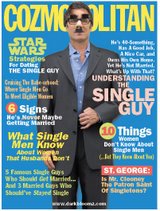It is a truth universally acknowledged that the available, sociable, and genuinely attractive man is a character highly in demand in social settings. Dinner hosts are always looking for the man who fits all the criteria. When they don't find him (often), theyIf we were more clever, we might have something funny to say about the subject.throw up their hands and settle for the sociable but unattractive, the attractive but unsociable, and, as a last resort, for the merely available.
The shortage of appealing men is a century-plus-old commonplace of the society melodrama. The shortage—or—more exactly, the perception of a shortage—becomes evident as you hit your late 20s and more acute as you wander into the 30s. Some men explain their social fortune by believing they've become more attractive with age; many women prefer the far likelier explanation that male faults have become easier to overlook.
The problem of the eligible bachelor is one of the great riddles of social life. Shouldn't there be about as many highly eligible and appealing men as there are attractive, eligible women?
Actually, no—and here's why. [read on]
Wednesday, April 9, 2008
The Eligible-Bachelor Paradox
Slate has just published an article that may be of interest to the dorks and social scientists intellectually curious readers of our site. It's titled "The Eligible-Bachelor Paradox: How economics and game theory explain the shortage of available, appealing men." The article, by Mark Gimein, opens:

